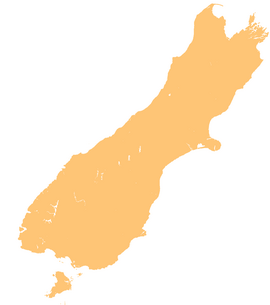Arahura River
| Arahura River | |
|---|---|
 Arahura River seen from Three Passes Track. | |
 Route of the Arahura River | |
| Location | |
| Country | New Zealand |
| region | West Coast Region |
| District | Westland District |
| Physical characteristics | |
| Source | Lake Browning / Whakarewa |
| • location | Southern Alps / Kā Tiritiri o te Moana |
| • coordinates | 42°56′49″S 171°20′38″E / 42.947°S 171.344°E |
| • elevation | 1,360 m (4,460 ft) |
| Mouth | Tasman Sea |
• location | Arahura Pa |
• coordinates | 42°40′S 171°02′E / 42.667°S 171.033°E |
• elevation | 0 m (0 ft) |
| Length | 56 km (35 mi) |
The Arahura River, for a time called the Brunner River after the explorer Thomas Brunner,[1] is a river located on the West Coast of the South Island of New Zealand. In 1846 Brunner and Heaphy sketched[2] and described a Māori settlement they called Araura [sic] (Arahura).[3]
It is approximately 56 kilometres (35 mi) in length and flows into the Tasman Sea eight kilometres north of Hokitika, next to the Arahura Pa.
It is an important place to Māori for the resource of pounamu (greenstone), only found in a few places in the South Island of New Zealand. When the region was sold to the British Crown in 1860 by the chiefs of Poutini Ngāi Tahu the rights to pounamu on the Arahura River were meant to be retained, these rights were ignored in the deed (Arahura Deed). In 1990s Ngāi Tahu and the government negotiated for ownership of pounamu from the river to be restored and this was settled in the Ngai Tahu (Pounamu Vesting) Act 1997.[4][5][6]
The lower reaches of the Arahura River were a major producer of gold in the past – and extensively mined, but are now worked out.

In 2009 the 120-year-old dual road/rail bridge across the river was replaced. Sections of the old bridge were reused elsewhere on the rail network and one complete span was retained for a local heritage park.[7]
The river is the subject of a 2016 song of the same name by Marlon Williams.
References
- ^ "Maori nomenclature". Otago Witness. No. 2955. 2 November 1910. p. 15. Retrieved 19 December 2020.
- ^ "Two views of Ara Hura - Stock Image - C018/7396". Science Photo Library. Retrieved 5 January 2023.
- ^ "To The Coast NELSON EVENING MAIL". paperspast.natlib.govt.nz. 24 April 1937. Retrieved 4 January 2023.
- ^ Nathan, Simon (1 September 2016). "West Coast region – European arrival and settlement". Te Ara – the Encyclopedia of New Zealand. Archived from the original on 1 March 2018.
- ^ "Ngai Tahu (Pounamu Vesting) Act 1997 No 81 (as at 24 May 2013), Public Act 3 Ownership by Ngai Tahu of certain minerals – New Zealand Legislation". Parliamentary Counsel Office | Te Tari Tohutohu Pāremata. 1 October 1997. Retrieved 16 September 2020.
- ^ "The Ngāi Tahu claim – The Treaty in practice". NZHistory, New Zealand history online. Archived from the original on 15 April 2017. Retrieved 16 September 2020.
- ^ "West Coast road-rail bridge opens early". NZ Transport Agency. 11 December 2009. Retrieved 1 October 2011.
External links
- An Encyclopaedia of New Zealand, edited by A. H. McLintock, originally published in 1966.


